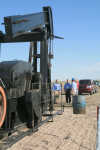Senator sees opportunities for Midwest in high oil prices

TRENTON -- Standing beside a new well northeast of Trenton Wednesday morning, U.S. Senator Ben Nelson said that the high price of oil is creating opportunities for increased oil production at home.
Nelson wants America's focus on oil production to switch from "the Middle East" to America's "Midwest." Drilling at home can produce almost immediate results, he said, reducing the country's reliance on foreign sources of oil and decreasing prices at the gas pump.
Nelson said that America's focus on oil production on-shore and off-shore will "send the message that we are becoming energy self-sufficient."
"The Shakespearean question, 'To drill, or not to drill?' has been answered," Nelson said. "We're going to drill."
Nelson said that increased oil activity throughout Southwest Nebraska is a "matter of personal pride," having grown up in McCook, the center of Red Willow County's "oil patch" activity. Nelson said it's exciting to see pumping units pumping and drilling rigs drilling again.
Other points of interest on Nelson's energy tour included an E85 gas station in Omaha, an ethanol plant run by landfill gas, a woodchip-powered energy plant at Chadron State College, plots of switch grass that can potentially be used for biofuels and a wind farm near Ainsworth with 36 turbines.
Nelson and nine other senators -- Democrats and Republicans, "The Gang of 10" -- have crafted bipartisan legislation that addresses the nation's energy crisis with short-term and long-term solutions.
The legislation would transition America's vehicles from running mostly on gasoline to using more fuels from renewable sources. It also calls for more conservation, consumer tax credits and new domestic oil drilling that can decrease gas prices at the pump in a relatively short time.
Nelson said, "Our comprehensive New Energy Reform Act envisions a dramatic change: it transitions us from the old energy economy to the new energy economy -- importing less oil from the Middle East, producing more biofuels and renewable energy in the Midwest. It harnesses American know-how to put more energy-efficient cars on the road and develop the natural power in renewable resources."
Goals of the legislation are: 1. Transition to renewable and energy-efficient vehicles; 2. Expand conservation; and 3. Allow responsible, targeted off-short drilling.
The objective of the legislation's "Apollo Project" is that 85 percent of America's cars and trucks will run on non-petroleum fuel in two decades by:
* Paying drivers to get rid of gas-guzzling vehicles. They can obtain a tax credit of up to $7,500 per vehicle to buy a new advanced-fuel and fuel-efficient car or truck, and up to $2,500 to upgrade older vehicles with advanced alternative fuel engines. Tax credits of up to $2,500 can also be obtained to buy highly fuel-efficient vehicles or hybrid electric vehicles.
* America becoming the world's leading manufacturer of alternative fueled cars and trucks. A new investment of $15 billion will help develop advanced batteries and new alternative fuel technology. It will also assist in retooling and re-equipping of U.S. automakers' plants to make alternative-fueled vehicles.
The legislation promotes conservation and renewable energy:
* Tax incentives are expanded for renewable energy, carbon reduction and efficiency. Tax credits also are available to promote production of wind, solar, geothermal, biomass and hydropower energy.
* New spending of $500 million will broaden research and development for new materials and innovations to boost vehicle fuel efficiency.
* A new investment of $2.5 billion will help develop next generation biofuels from sources such as cellulosic ethanol made from switchgrass and other agricultural waste materials.
* Billions in bonds are steered toward new renewable energy projects run by states, communities, Indian tribes, public power generators and electric cooperatives.
* Gas station owners can obtain $50,000 per station to install new E85 pumps so that more Nebraskans can fill up with ethanol produced in Nebraska from Nebraska corn growers.
* Transmission capacity of power generated from renewable sources is expanded, helping Nebraska take advantage of its ranking as the sixth windiest state.
* Weatherization Assistance which will help hundred of Nebraskans improve their energy efficiency and save hundreds of dollars on their energy bills.
The legislation authorizes new energy production to increase supply:
* New areas of the Gulf of Mexico are opened to leasing for drilling, aiming to boost U.S. supply and bring down gas prices.
* Coastal environmental protection is enhanced.
* All new oil and gas produced would be for domestic use only.
* Grants and loan guarantees are authorized to develop coal-to-liquid fuel plants that can capture carbon before it's released into the air.
The legislation develops a long-term strategy to strengthen America's energy security:
* A National Commission on Comprehensive Energy Policy is established to identify "inhibitors and prohibitors" of goals.
The commission will address issues such as climate change, nuclear and renewable energy for the future, and upgrades to the national power grid and other energy infrastructure.
Nelson said the legislation is fully paid for. The $84 billion New ERA plan will be paid for with loophole closers and other revenues. About $30 billion will come from revenues paid by the oil and gas industry and ensuring that the government receives a fair share of revenue from Gulf of Mexico leases.
Nelson said too that tax credits will be rescinded to oil companies. "With oil companies' high profits, we will take those tax breaks away," Nelson said.
